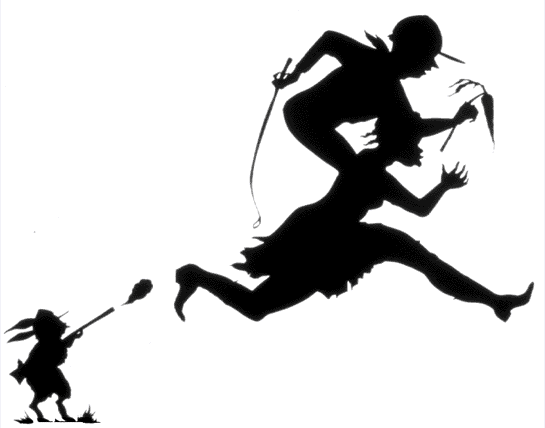
When I was coming along in Georgia, I became black in more senses than just the kind of multicultural acceptance that I grew up with in California. Blackness became a very loaded subject, a very loaded thing to be--all about forbidden passions and desires, and all about a history that's still living, very present ... the shame of the South...
Kara Walker, artist
I know what she's talking about. Blackness and the South exist in a different way, than blackness and, say, Detroit. For one thing, there's a closeness between the races in peculiar ways. In Portnoy's Complaint, the narrator tells about seeing "the girl" who helped with the ironing, eating lunch alone in the kitchen, noshing on tuna salad made only for her. That's New Jersey for you. The South is more blatantly racist, and yet kinder, both together. For years, my family employed Mary and Dave and it says quite a lot that I never knew their last name, and don't know it today. At lunch, Mary ate the same food we did, but my grandmother ostentatiously left out handfuls of change, and marked the liquor bottles as some sort of test.
When Mary's daughter went to college for her Master's degree at OU, my grandparents paid her full tuition, drove her to the campus, and introduced her to the dean. And yet, my grandfather told me time and time again that black people were like little children and it was our duty as white people to care for them. This notion struck me as sickening, and I know I said as much, and at great loud length too. But I revolted against this view less as a civil rights enthusiast, and more from the standpoint of a child.
If you grew up in the South, at a certain time in this country, and in a certain way, you got fobbed off on black people. And as a child, you knew instinctively you'd rather be with them than anyone else around. As I said in one of my posts, I took many train trips alone, with only a note pinned to my ruffled front that said Mr. Porter, This is our little Writer-to-the Stars. She is going to visit her great-aunt in Sapulpa. Please make sure she buys a sandwich and gets off at the right station. Thank you. Mr. and Mrs. Writer-to-the-Stars. A very kind porter always looked after me. I can't recall any of them being less than impeccably polite.
I was also handed off to a succession of maids and cleaning ladies who told me wonderfullyPosting frightening stories, let me know when I was a pain in the butt, and sometimes took me home with them. I always had the feeling they were less hypocritical than the grown-up white people around me. They were certainly more controlled than most of the alcoholic white adults I knew, but that was through dire necessity. Still, if I found a racist anywhere around, I always stirred the pot. I can remember, at the dinner table, delighting as my grandmother broke out in racking sobs whenever I pointed out the half-moons on my nails...one of the sure signs you have black blood. While this Southern-style drama raged on, Mary would stoically pass around the cornbread. (No. We didn't have good manners. Not about race.)
It's complicated, this race stuff. In one way, it's hard for me to dump my To Kill A Mockingbird outlook, but I've got to. That time is gone, baby, gone. I see multi-racials all around me in every lovely permutation. The teenagers and people in their twenties don't seem to notice race much at all. Even here, even in Dallas, Texas.
All our weird convolutions, way back then, were the results of people living in an unholy situation. It deformed everyone. For those of us who baked and steamed through those hot drowsy years, feeling grubby and soiled from an unjust immovable system, we thought we'd have to overcome racism by inches and decades.
I know that's what I thought.
Didn't occur to me that a sweeping change could happen in one blast, like a cloudburst.
Never occurred to me at all.
When Mary's daughter went to college for her Master's degree at OU, my grandparents paid her full tuition, drove her to the campus, and introduced her to the dean. And yet, my grandfather told me time and time again that black people were like little children and it was our duty as white people to care for them. This notion struck me as sickening, and I know I said as much, and at great loud length too. But I revolted against this view less as a civil rights enthusiast, and more from the standpoint of a child.
If you grew up in the South, at a certain time in this country, and in a certain way, you got fobbed off on black people. And as a child, you knew instinctively you'd rather be with them than anyone else around. As I said in one of my posts, I took many train trips alone, with only a note pinned to my ruffled front that said Mr. Porter, This is our little Writer-to-the Stars. She is going to visit her great-aunt in Sapulpa. Please make sure she buys a sandwich and gets off at the right station. Thank you. Mr. and Mrs. Writer-to-the-Stars. A very kind porter always looked after me. I can't recall any of them being less than impeccably polite.
I was also handed off to a succession of maids and cleaning ladies who told me wonderfullyPosting frightening stories, let me know when I was a pain in the butt, and sometimes took me home with them. I always had the feeling they were less hypocritical than the grown-up white people around me. They were certainly more controlled than most of the alcoholic white adults I knew, but that was through dire necessity. Still, if I found a racist anywhere around, I always stirred the pot. I can remember, at the dinner table, delighting as my grandmother broke out in racking sobs whenever I pointed out the half-moons on my nails...one of the sure signs you have black blood. While this Southern-style drama raged on, Mary would stoically pass around the cornbread. (No. We didn't have good manners. Not about race.)
It's complicated, this race stuff. In one way, it's hard for me to dump my To Kill A Mockingbird outlook, but I've got to. That time is gone, baby, gone. I see multi-racials all around me in every lovely permutation. The teenagers and people in their twenties don't seem to notice race much at all. Even here, even in Dallas, Texas.
All our weird convolutions, way back then, were the results of people living in an unholy situation. It deformed everyone. For those of us who baked and steamed through those hot drowsy years, feeling grubby and soiled from an unjust immovable system, we thought we'd have to overcome racism by inches and decades.
I know that's what I thought.
Didn't occur to me that a sweeping change could happen in one blast, like a cloudburst.
Never occurred to me at all.




No comments:
Post a Comment